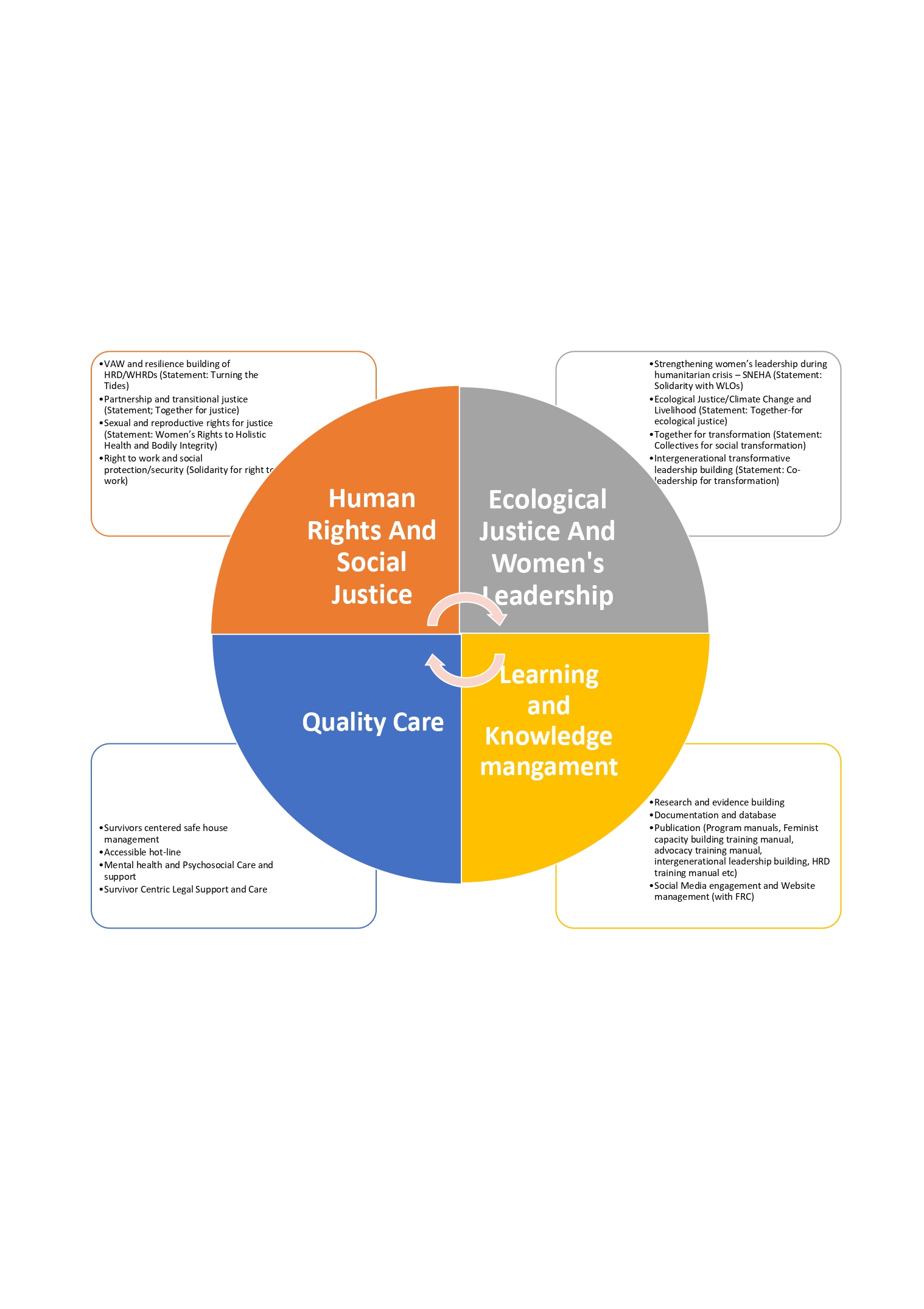Women's Rehabilitation Centre (WOREC) is a non-governmental organization working for the protection and promotion of human rights. Established in 1991, WOREC is one of the leading national organizations that works to prevent violence against women, its causes and consequences, and to ensure economic, social and cultural well-being of women as well as other marginalized groups by promoting their access to rights and social justice.
Article 1 of Universal Declaration of Human Rights (UDHR, 1948) states, “All human beings are born free and equal in dignity and right.” Various international covenant and conventions, the Constitution of Nepal and other documents have ensured that the rights of women and other marginalized communities are also human rights.
Nevertheless, this community has been deprived of social, economic, cultural and political rights under the guise of discriminatory power structure enshrined with the mixture of feudalistic capitalistic Patriarchy. The consequences are rampant around which world economic policies is guided by globalized neo-liberalism centered on economic growth. The adoption of these regulations has produced complicated effects that have made societal competition for capturing limited resources with the greed of earning profit and tensions within the world's poorest and most marginalized countries. Nepal is not isolated with the above stated mechanism which was clearly exemplified during COVID-19 where state owned poor health institutions were not able to oblige the right to health and living of its citizen.
Objectives:
Major sub-themes:
Nepal has shown its commitment to various international treaties and agreements, given environmental justice is a multidimensional national and international topic. Under Article 30 of Nepal's constitution 2072, every citizen shall have the right to live in a clean and healthy environment. However, environmental impact has increased hierarchical inequality among communities that have been discriminated against for centuries based on caste, gender, and class. Thus, it is significant to develop environmental laws, regulations, and policies and operate implementation policies and programs from the justice perspective. There should be meaningful involvement of all people in the environmental decision-making process with no discrimination on any basis. Redistributive concepts should be adopted, while programs should be created with the primary sentiment that no individual or community should be disproportionately harmed due to environmental impact. Therefore, ecological justice means analyzing environmental aspects using human and civil rights. Ecological justice ensures the right of every individual and community to live in a clean and healthy environment and measures to minimize possible risks.
Objective of Theme:
Major sub-theme:
3. Quality Care
Quality of care refers to the degree to which services provided to survivors meet the necessary standards of safety, effectiveness, survivors-centered, timeliness, efficiency, and equity. It is a multidimensional concept that involves a range of factors including various services like a safe house, hotline, Legal aid, Psychosocial counseling, and staff care with technical competence, communication, accessibility, access to services, and empathy. This concept note aims to provide an overview of the key elements of quality of care, its importance, and some strategies for improving it.
Gender-based violence (GBV) is a significant public health issue in Nepal, and the government and various non-governmental organizations have established several mechanisms to provide quality care to survivors of GBV. These mechanisms include safe houses, legal aid, psychosocial counseling, and hotlines.
Objectives:
Major Sub-themes:
4. Learning and Knowledge Management
Feminist learning and knowledge management will be set as foundational approach for overall mission of the organization. Effective communication is key to meeting the mandate set out by WOREC in enhancing Community level Activism to impact the lives of women in Nepal. Its affect is significant in building the efficiency of any project or approach WOREC had in this regard. This Strategy sets out the overall objectives for WOREC’s Communications with the main target audiences for outreach, and specifies the channels and tools to execute the strategy. The strategy will be used to develop annual and other periodic action plans for the KMC unit in compliance with other projects/programs. WOREC develops the Communication Plans and shall allow for effective implementation and monitoring of the impact. WOREC works on a diverse portfolio across Nepal with multitude of stakeholders spanning national to community level. Therefore, WOREC will take account of different contexts and needs of its audience and programs within its communications whenever possible. WOREC’s approach towards learning and communications is to avoid jargons and technical language where not appropriate making it appropriate to the audience at which targeted. Official language at WOREC is Nepali, English is frequently used due to ease however it is emphasized that Nepali is used as the official communication within inter offices. This strategy further finds its applicable and important for WOREC to use Maithili, Tharu (Dangali), Tharu (Kailali) as communications need in the communities where it is mostly applicable as a spoken language. Wherever available, WOREC’s communication will strive to complement users of non-nepali language with native language materials. WOREC will respect the Consent Giving procedure at all its information collection process applicable to audio, photo, video, personal information or details of incidents that someone may not be willing to share. Knowledge management activities will be documented within all programs differently. This will ensure every approach has a clear interlink. An annual knowledge and communication plan will be developed and implemented. A variety of tools are used through various channels for this purpose. Not all activities fall under the KMC department and will be a shared process between different departments.
Objectives:
Major Sub-themes:
Dissemination of information and communication
